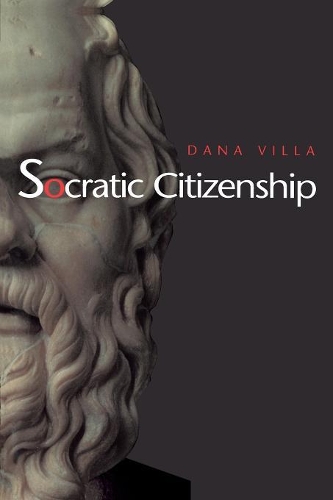
Socratic Citizenship
(Paperback)
Publishing Details
Socratic Citizenship
By (Author) Dana Villa
Princeton University Press
Princeton University Press
30th October 2001
United States
Classifications
Professional and Scholarly
Non Fiction
Civics and citizenship
Ancient Greek and Roman philosophy
323.6
Physical Properties
Paperback
392
Width 152mm, Height 235mm
595g
Description
Many critics bemoan the lack of civic engagement in America. Tocqueville's "nation of joiners" seems to have become a nation of alienated individuals, disinclined to fulfill the obligations of citizenship or the responsibilities of self-government. In response, the critics urge community involvement and renewed education in the civic virtues. But what kind of civic engagement do we want, and what sort of citizenship should we encourage In Socratic Citizenship, Dana Villa takes issue with those who would reduce citizenship to community involvement or to political participation for its own sake. He argues that we need to place more value on a form of conscientious, moderately alienated citizenship invented by Socrates, one that is critical in orientation and dissident in practice. Taking Plato's Apology of Socrates as his starting point, Villa argues that Socrates was the first to show, in his words and deeds, how moral and intellectual integrity can go hand in hand, and how they can constitute importantly civic--and not just philosophical or moral--virtues.More specifically, Socrates urged that good citizens should value this sort of integrity more highly than such apparent virtues as patriotism, political participation, piety, and unwavering obedience to the law. Yet Socrates' radical redefinition of citizenship has had relatively little influence on Western political thought. Villa considers how the Socratic idea of the thinking citizen is treated by five of the most influential political thinkers of the past two centuries--John Stuart Mill, Friedrich Nietzsche, Max Weber, Hannah Arendt, and Leo Strauss. In doing so, he not only deepens our understanding of these thinkers' work and of modern ideas of citizenship, he also shows how the fragile Socratic idea of citizenship has been lost through a persistent devaluation of independent thought and action in public life. Engaging current debates among political and social theorists, this insightful book shows how we must reconceive the idea of good citizenship if we are to begin to address the shaky fundamentals of civic culture in America today.
Reviews
"An exceptional book, well written and instructive at every point."--Choice "This book deserves a wide, appreciative readership, both for the importance of the argument and for the depth and breadth of the interpretations that support it."--Gerald Mara, American Political Science Review "Villa has put his finger on the tension to which liberals and deliberative democrats will have to devote ever more attention, and he has written an informative and stimulating book."--Cillian McBride, Philosophy in Review
Author Bio
Dana Villa teaches political theory at the University of California. Santa Barbara. He is the author of Politics, Philosophy, Terror: Essays on the Thought of Hannah Arendt and Arendt and Heidegger: The Fate of the Political (both Princeton) and editor of The Cambridge Companion to Hannah Arendt.
